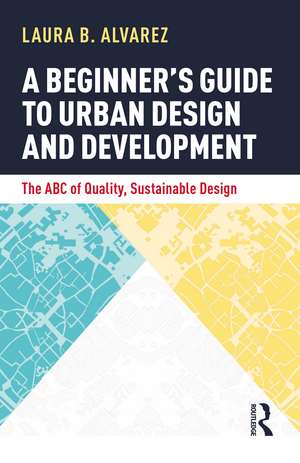A Beginner's Guide to Urban Design and Development: The ABC of Quality, Sustainable Design
Autor Laura B. Alvarezen Limba Engleză Paperback – 18 apr 2023
| Toate formatele și edițiile | Preț | Express |
|---|---|---|
| Paperback (1) | 265.70 lei 3-5 săpt. | +48.29 lei 4-10 zile |
| Taylor & Francis – 18 apr 2023 | 265.70 lei 3-5 săpt. | +48.29 lei 4-10 zile |
| Hardback (1) | 711.55 lei 6-8 săpt. | |
| Taylor & Francis – 18 apr 2023 | 711.55 lei 6-8 săpt. |
Preț: 265.70 lei
Nou
50.84€ • 53.22$ • 42.32£
Carte disponibilă
Livrare economică 10-24 martie
Livrare express 21-27 februarie pentru 58.28 lei
Specificații
ISBN-10: 1032154152
Pagini: 296
Ilustrații: 30 Tables, color; 23 Line drawings, color; 87 Halftones, color; 110 Illustrations, color
Dimensiuni: 138 x 216 x 17 mm
Greutate: 1.12 kg
Ediția:1
Editura: Taylor & Francis
Colecția Routledge
Locul publicării:Oxford, United Kingdom
Public țintă
General, Postgraduate, and ProfessionalRecenzii
Prof Matthew Carmona, The Bartlett School of Planning, UCL, UK
"As a non-planning person with community level involvement in the built environment and a personal interest in sustainable development, the content of The ABC of quality, sustainable design will be invaluable to me. It has vastly increased my understanding of the development process and the need for cross-sector collaboration and multi-disciplinary teams. This book provides me with tools that I can apply in a very practical way, giving me a greater sense of confidence to challenge poor decisions and practice by developers, architects, planners and local authorities. Each chapter deals with a specific topic that is expanded through debate and case studies with the final chapter drawing up conclusions set out in a comprehensive framework that sets out the ethos for good practice.
I believe this book should be on reading lists for students and professionals in urban practice, planning, construction and architecture because it sets out the case for accountability across sustainability, economy and society. Bad development, whether in terms of poor design or poor environmental performance has long term, irreversible consequences. Dr Alvarez manages to bring together complex questions critical to the future of urban design, a clearly set out pathway forward and to use language that is accessible and enjoyable. The voice and the experience of the author is present, which gives an insight into the decades of thinking that has gone into this book - making it more personally accessible to the reader. A very educational, enjoyable and rewarding read."
Penney Poyzer, Chair Nottingham Good Food Partnership, UK
Cuprins
Introduction; 1. Understanding Good, Sustainable Design; 2. The Design Process; 3. Design Agents; 4. Influencing Design; 5. Design Form; 6. Evaluating Design; Conclusions: The ABC of Quality, Sustainable Design
Notă biografică
Laura B. Alvarez is a writer, critic, and commentator, with more than 20 years in international urban and architectural practice, in which she has designed award-winning schemes and written ground-breaking planning guidance that has place democracy at its core.
Lauräs research on socially sustainable neighbourhoods led to the development of applicable theory and has been widely praised for its innovative approach. She lectures at various universities and collaborates with acclaimed institutions, publications, and broadcast media.
Descriere
This book provides invaluable guidance to all those with an interest in placemaking and the built environment, from those with no experience to those who have worked for many years in industry, illustrating key principles that will secure higher quality, more sustainable design in accessible, jargon-free language.
The author explains the design process in a straightforward way, exploring the different roles and highlighting the opportunities and limitations different agencies have to influence design over the various stages of the process. Examples from the UK and worldwide look at how the system operates and how best practice can make a real difference on the ground. Case studies examine situations where quality or sustainability fell short – and how this could have been avoided. This book also showcases a variety of evaluation tools, explaining how they operate, and giving guidance on how to create project-specific tools to drive schemes forward. With community empowerment at its core, the book explains technical language and shares bountiful knowledge to broaden place democracy and make influencing design accessible to many, not just a few.
This is a book that brings together all the various parties involved in shaping the built environment, demonstrating that collaboration and mutual understanding are key to achieving better quality, more sustainable design.
